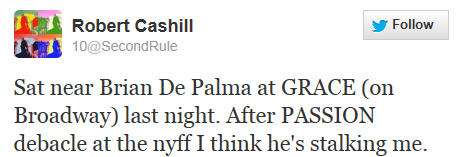
Updated: Saturday, October 13, 2012 9:54 AM CDT
Post Comment | Permalink | Share This Post
 Hello and welcome to the unofficial Brian De Palma website. Here is the latest news: |
|---|
E-mail
Geoffsongs@aol.com
-------------
Recent Headlines
a la Mod:
Listen to
Donaggio's full score
for Domino online
De Palma/Lehman
rapport at work
in Snakes
De Palma/Lehman
next novel is Terry
De Palma developing
Catch And Kill,
"a horror movie
based on real things
that have happened
in the news"
Supercut video
of De Palma's films
edited by Carl Rodrigue
Washington Post
review of Keesey book
-------------
Exclusive Passion
Interviews:
Brian De Palma
Karoline Herfurth
Leila Rozario
------------
------------
| « | October 2012 | » | ||||
| S | M | T | W | T | F | S |
| 1 | 2 | 3 | 4 | 5 | 6 | |
| 7 | 8 | 9 | 10 | 11 | 12 | 13 |
| 14 | 15 | 16 | 17 | 18 | 19 | 20 |
| 21 | 22 | 23 | 24 | 25 | 26 | 27 |
| 28 | 29 | 30 | 31 | |||
De Palma interviewed
in Paris 2002
De Palma discusses
The Black Dahlia 2006

Enthusiasms...
Alfred Hitchcock
The Master Of Suspense
Sergio Leone
and the Infield
Fly Rule
The Filmmaker Who
Came In From The Cold
Jim Emerson on
Greetings & Hi, Mom!
Scarface: Make Way
For The Bad Guy
Deborah Shelton
Official Web Site
Welcome to the
Offices of Death Records

In a separate segment of the video, McAdams continues, "I hope it's a thrilling ride for them, and I hope De Palma fans will enjoy it. I hope there will be new De Palma fans because of it. I think he's doing a really unique thing. I think he's got his own stamp he's putting on his films, and I think it's very cool, I think it's brave, and brazen. So yeah, I hope new people will join the De Palma club."
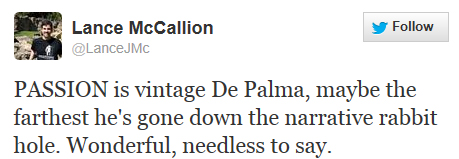
"He said he was fortunate to be in a new group of directors, but 'it’s a small group and it’s not going to get any bigger.' For Passion, DePalma had passed the script to his fellow directors and originally included a convoluted dream-within-a-dream structure that they eventually convinced him to discard. 'They read it and they liked the script very much but I’d done this dream sequence and done a take off on Inception, a movie I quite liked. And the whole idea was the phone was in the safe in the third level dream and my fellow directors looked at me and said, "Get rid of that.”'
"'It took three of us, too.' Baumbach added.
"'It was unanimous, when you have unanimous consent [that’s what you do]. So it’s very helpful,' DePalma said.
“'There is an isolated experience to being a director,' Baumbach said. 'It’s very communal because there’s a crew, but it’s only you. You’re the one on the hook. And seeing it in the tradition of Brian and the people he came up with and hearing stories of how they worked on each other's movies. And Steven [Spielberg] came in on the set of Scarface and directed a few shootouts in the final big battle. Both it’s cool to hear those things and it opened us up. It made it less precious in a way, all of us, we can talk about it and help each other.' When Wes was having trouble coming up with how to visualize shooting wind for the climax of his latest Moonrise Kingdom he turned to De Palma who offered up a solution: make sure you have things in the air. Simple, but it works.
“'Essentially we feel the same about movies and moviemaking but we come at it in entirely different ways,' said Baumbach."
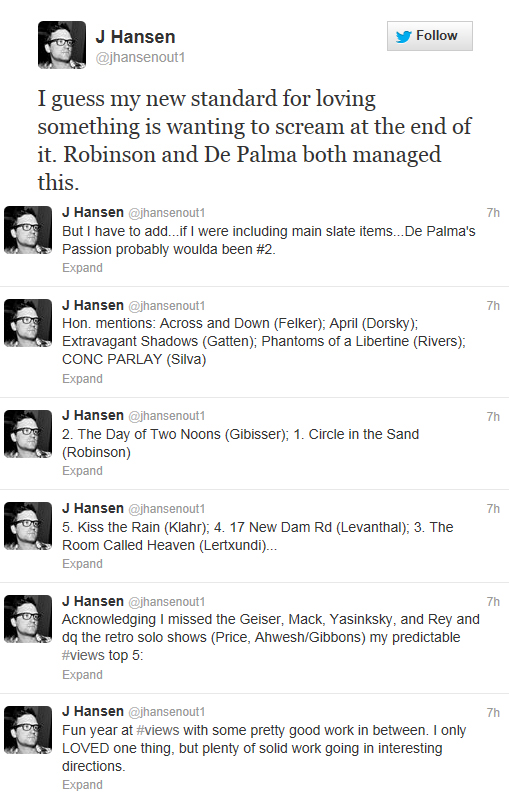
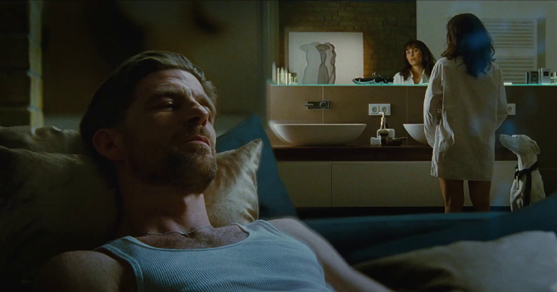
Cinespect's Cole Hutchinson, a self-proclaimed "De Palma admirer," says that Passion "manages to stand proudly amongst the best of [De Palma's] oeuvre." Hutchinson asserts that, like most of De Palma's films, Passion will please an audience simply seeking entertainment, while also offering layers of meaning for those interested in digging deeper. "This is a De Palma film that celebrates De Palma films while simultaneously mocking them," writes Hutchinson. "With spectacular performances across the board, an especially effective trademark split-screen moment, and the modern wit to suggest that the ubiquitous Apple laptop is the new symbolic phallus of easy power (also the tool of its eventual inevitable downfall), Passion is an exquisitely enjoyable summation of its director’s past triumphs streamlined into a sexy morality tale for today’s bizarre, superficial world."
Another self-professed De Palma fan, The Highlighter's Alex Greenberger, writes that "Passion is another defiantly satirical film from De Palma, and therefore it’s a work that’s sure to polarize for years to come. For De Palma’s fans (of which I am one), Passion is going to be an extremely rewarding experience, complete with diabolical lesbians, mistaken identities, twins and comments on gender roles. For his detractors, this will be another miserable failure, complete with awful dialogue, mediocre performances and baroque twists." Greenberger highlights that there are essentially two halves to the film. "For the first half, which may be a bit more stolid (and, as a result, a little less successful) than typical De Palma fare, it’s just one entertaining sequence after another. Passion, at its start, plays like a parody of workforce melodrama—something like Disclosure, maybe—with awesomely bad crying and a purposefully overconfident score from Pino Donaggio. Even the performances point to a masterful dissection of the melodrama—McAdams brilliantly says “Call me NEVER!” and throws her phone to the ground with such panache that it’s hard not to be entranced by the intentional mediocrity of this movie. But at a critical moment, one that of course involves a split-screen, since this is the world of Brian De Palma, the film snaps and becomes so formally refined—everything seems to click together at once, and the narrative dramatically perks up." Greenberger goes on to praise the split screen sequence and the cinematography: "It almost goes without saying that the split-screen sequence, which juxtaposes a Claude Debussy ballet with a complex murder and then proceeds to weave in and out of the murderer’s subjectivity, is stunning. But it’s José Luis Alcaine’s super-saturated photography that shines in this film. His beautiful, tight close-ups of the film’s plethora of ridiculous designer shoes are marvelous, but that, combined with De Palma’s directorial abilities, make this film yet another formally concerned (and successful) work."
Floating Heads' Cory Everett writes of De Palma, "After a half decade away from the camera, there’s a certain thrill in seeing the director get back to doing what he does best. In Passion, (a remake of the 2010 French film Love Crime), DePalma finds the perfect vehicle to indulge his cinematic obsessions." Everett echoes the idea that the film is split in half, writing that "the second half of the picture loses some of the trashy fun of the first half but replaces it with rococo camerawork, canted angles, split screens and a heavy dose of film noir lighting courtesy of cinematographer Jose Luis Alcaine (on loan from Pedro Almodovar). De Palma also recruits one of his longtime composers Pino Donaggio for a bombastic score. It’s a B-movie and minor work for the filmmaker but still a fair bit of fun for anyone who misses the the feel of those earlier works."
And finally, The Lumière Reader's Brannavan Gnanalingam has posted a late dispatch from Venice, where he experience the boos that greeted both Terrence Malick's To The Wonder and De Palma's Passion. However, while he was not surprised by the booing, Gnanalingam enjoyed both films quite a bit. "Full of narrative twists, femme fatales, double identities, and an absurd lack of subtlety," writes Gnanalingam, "it’s yet another homage to Hitchcock, in a career full of homage. The performances veered eerily close to parody (McAdams as the horrible boss almost fails to convince in her excesses, while Noomi Rapace plays it straight almost to the point of falling asleep), the setting was grand and sneeringly superficial, and the continual narrative contrivances drew laboured groans of agony from some critics. All of this said, it was all rather fun."
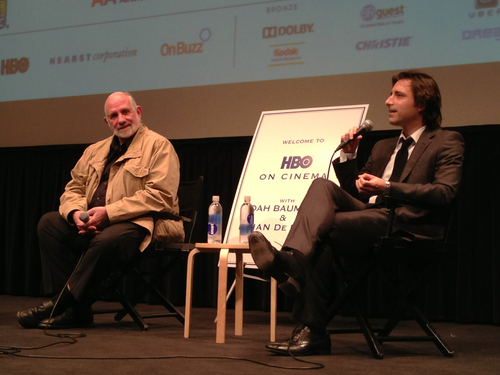
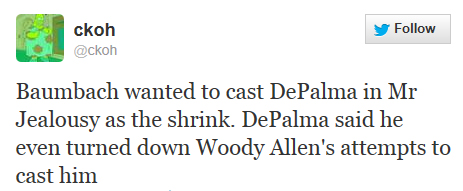
[Note: the role of the shrink in Mr. Jealousy ended up being played by Peter Bogdanovich. De Palma did appear as a "Famous American Movie Director" in the extremely hard to find German film, Rotwang muß weg! (1994), written and directed by Hans-Christoph Blumenberg.]
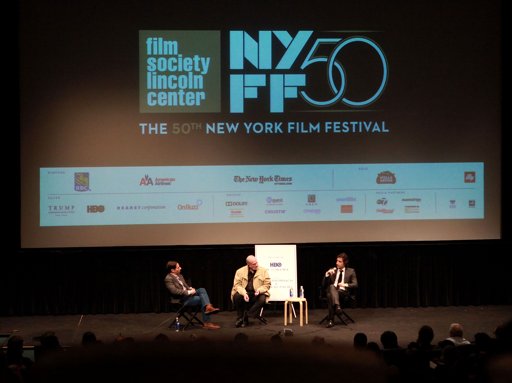
Pictured above: Scott Foundas (left) moderating "On Cinema" discussion between Brian De Palma and Noah Baumbach at the New York Film Festival Sunday.
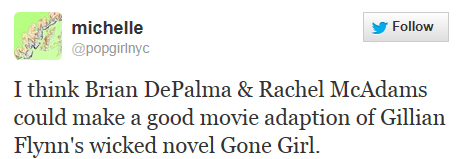
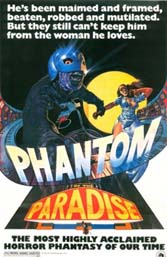 Brian De Palma's phenomenal Phantom Of The Paradise screens at 12:05 tonight (Saturday) at Brooklyn's Nighthawk Cinema. (So if you happen to be lucky enough to be heading to tonight's 9pm screening of De Palma's Passion at the Walter Reade Theater, you could make it a De Palma double feature, with a nice break in between.) The Principal Archivist at The Swan Archives notes that it will be a DCP screening, which, despite all the troubles with the DCP [non-]screening of Passion a week ago, should make for a pristine cinematic experience. "DCP," the Archivist adds, "provides a super high quality, scratch and splice free presentation with remixed sound...the [Phantom Of The Paradise] has never looked or sounded better." Phantom also screened last night at midnight at the Nighthawk.
Brian De Palma's phenomenal Phantom Of The Paradise screens at 12:05 tonight (Saturday) at Brooklyn's Nighthawk Cinema. (So if you happen to be lucky enough to be heading to tonight's 9pm screening of De Palma's Passion at the Walter Reade Theater, you could make it a De Palma double feature, with a nice break in between.) The Principal Archivist at The Swan Archives notes that it will be a DCP screening, which, despite all the troubles with the DCP [non-]screening of Passion a week ago, should make for a pristine cinematic experience. "DCP," the Archivist adds, "provides a super high quality, scratch and splice free presentation with remixed sound...the [Phantom Of The Paradise] has never looked or sounded better." Phantom also screened last night at midnight at the Nighthawk.In his opening paragraph, Courrier mentions that he screened Phantom in a class on Alfred Hitchcock and De Palma: "Director Brian De Palma has accumulated a long list of neglected gems (The Fury, Blow Out, Casualties of War, Redacted), but the one whose neglect makes the least sense is his ingenious satirical rock musical, Phantom of the Paradise (1974). Fiendishly clever and percolating with film-making fever, De Palma provides ingenious allusions to Phantom of the Opera, The Cabinet of Dr. Caligari and The Picture of Dorian Gray. (Last year, while teaching a class on Alfred Hitchcock and Brian De Palma, I had more angry responses to this picture than some of De Palma's more inflammatory work.) But this pulsing musical comedy is an exhilarating modern retelling of the Faust myth (with roots in Dante's Divine Comedy) wherein a man becomes so consumed by his thirst for divine knowledge that he sells his soul to the Devil. In Phantom of the Paradise, though, the thirst is for something perhaps a little less lofty: rock immortality."